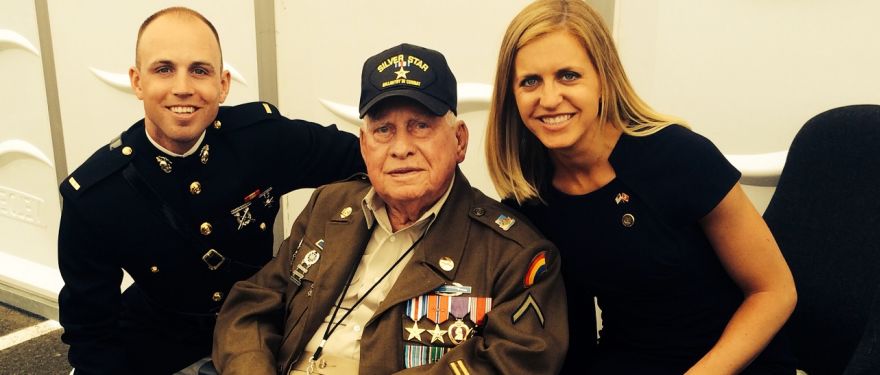A fellow Marine Officer and other members of the HBS Armed Forces Alumni Association graciously welcomed me to campus. Together we crossed the Lars Anderson Bridge over the Charles to hear Bob Woodward and Carl Bernstein speak in the John F. Kennedy Jr. Forum.
The discussion in the Forum was dynamic and the energy was contagious. Afterwards, we grabbed a beer at Bartley’s in Harvard Square where my new friends caught up on the Forum’s discussion, as well as their HBS cases that day— a LEAD case about a protagonist facing a management turnaround, a TOM case about a restaurant’s operations, and a FIN case valuing a Pharma company. As we headed back to Allston that night, I was pretty excited about the HBS students I had met, but still not sure what to expect the following day when I attended class in Aldrich.
The next morning after coffee and discussion group in Spangler, I headed to LEAD class with Section I 2007. At the beginning of class, my friend and fellow Marine introduced me to her entire section of 90 students. What happened next has stayed with me ever since. Not only did they clap to welcome me to campus, they all stood up. The class gave me a standing ovation that felt like it lasted an hour-- (in reality was likely about two minutes). I would visit six business schools that winter. Nothing came close to how I was welcomed and my service was appreciated at HBS.
I was fortunate to have the opportunity to study at HBS - an opportunity that I am still grateful for to this day. My three years on campus (I completed a joint MPA/MBA degree with The Kennedy School) were a dynamic experience from start to finish. I found myself surrounded by so many smart and inspiring people who collectively brought such diverse perspectives. My first seat-mates were-- on my left,-- a young man from Baltimore who had been a leader in the retail industry, and on my right, a gentlemen from India who had excelled in mobile payments and was now considering moving in to management consulting.
I also met one of my best friends that first week— she heard that I had served in the Marines, in an officer corps that was only 6% women at the time, and she sought me out to tell me about the women’s organization she founded in college. We’ve been practically inseparable ever since.
Additionally, I found myself drawn to many of my classmates who were also called to HBS by the mission, “to educate leaders who make a difference in the world.” A friend of mine had founded a non-profit in Kenya; another served in Teach for America.
I had come to HBS with a very specific to purpose—to gain a best-in-class general management education that I hoped to apply at some point in time to the public good. Immediately following HBS, I was fortunate to continue my public service on The American Battle Monuments Commission—which manages America’s overseas cemeteries, monuments, and memorials. This was a similar to a board role and as such, I was able to do this while working full time running a business at PepsiCo—allowing me continue building a critical general management skill-set in a world-class organization known for growing leaders.
I would have a number of general management roles at PepsiCo over the course of over five years—both in the food and beverage divisions. Being “in the arena” of line management taught me invaluable lessons that I call to mind each day in my current job.
Through serving on the American Battle Monuments Commission, I visited 21 of America’s 25 overseas cemeteries and viewed the final resting place of over 100,000 brave Americans who made the ultimate sacrifice for our country. The experience heightened my urgency to serve again, and so when the VA crisis happened in May of 2014, I wanted to come to Washington and help.
My boss, Secretary McDonald, was the former CEO of Proctor & Gamble—one of PepsiCo’s biggest competitors for talent—so he understood first-hand the value of line management experience in a top organization. We also shared a customer-centric view and I deeply admired his vision and determination to bring this vision and practice to our nation’s Veterans via VA. I was humbled and honored when Bob asked me to come join his leadership team.
Today, as I lead a large and dynamic team at the nation’s second largest cabinet agency of more than 350,000 employees, I call to mind lessons learned from my HBS experience every day. I am grateful for the opportunity to utilize my management education and skillset in the service to others and for getting to do each day what it is that I came to HBS to do.
As I look around Washington, I am encouraged to see friends and fellow MBA’s who are serving as well—in various cabinet agencies, on the Hill, and right here at the Department of Veterans Affairs. I have no doubt you will be reading about their work in future HBS cases and LEAD and Paul Marshall’s Turnarounds class.
Finally, we need good, smart, values-based leaders in government and one can really make a difference here. I hope future HBS students will consider applying their skillsets to the public good, in the great fulfillment of HBS’s mission, “to educate leaders who make a difference in the world."

